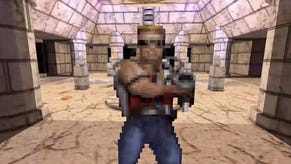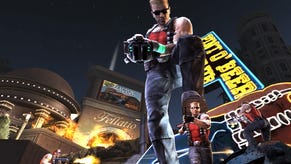Duke Nukem Forever: A Discussion with Randy Pitchford
Why the review bar graph "looked like a pair of tits".
Duke Nukem Forever launched in June 2011 after 15 years in development, the longest-ever video game development period. The story of its creation is one of peaks and troughs and high drama, but that's not what we sit down with Gearbox Software boss Randy Pitchford, the man who saved Duke from development hell, to talk about.
Instead, we're here to talk about the reception to the game. Upon launch reviews were mixed. Some were positive. Some were not. Many critics slammed the poor visuals and archaic design, and some even called its humour offensive. Eurogamer's Duke Nukem Forever review returned a 3/10. "This is far more coarse than Duke 3D ever was, the humour uniformly witless, a parade of blunt profanity, childish poo and wee jokes and obvious innuendo that makes it feel more of a piece with Duke ripoffs like Redneck Rampage and Postal 2: similarly weak games which failed to mask their lack of polish and ideas under a stained duvet of juvenile outrage," wrote Dan Whitehead. After the dust settled, Duke Nukem Forever found itself with a 54 Metascore - not what expectant fans had hoped for.
At a recent preview event for Borderlands 2, Eurogamer sat down with Randy Pitchford to discuss the reaction to the game, find out whether he stands by comments he made to Eurogamer ahead of the game's launch ("the last time I had a really solid experience like this was Half-Life 2") and to get his take on the video game press.
In the run up to the game's release you compared Duke Nukem Forever to Half-Life 2. Do you stand by that? It wasn't a PR thing?
Randy Pitchford: I still stand by that. When I played what 3D Realms had been working on I was really surprised by it. Like everyone, I thought who knows what the hell those guys were doing? And here there was a lot of stuff.
I don't know if you've played Duke Nukem Forever. It's awesome. I'm shrunken down and I'm running through a hamburger restaurant and I'm jumping across vats of fry oil on floating hamburger buns to navigate this environment. And when you realise what the actual gameplay is, the actual gameplay is very much like Half-Life.
It's basically a linear, narrative experience, but the puzzles are derived from the environment. It's not just 'shoot the guy'. Some of it's about, 'how do I navigate through this? What do I manipulate in the environment to make my path?' There was one point where I was out in the construction yard and I can't reach this ledge, and there's this giant container that's a little tippy, and if, oh, if I get these heavy things and I roll them down to the container it'll tip the container and that's how I get up to that higher ledge I couldn't get to before.
That's like a Half-Life puzzle.
And it occurred to me, the pacing was exactly like Half-Life 2, where the game would get me in a puzzle space and I would be confined there until I worked out what the components of the puzzle space are. There's this and that and the other thing. Okay, I manipulate that and that's how I progress, and then it alternates that pace with some combat. Bring in some enemies and those increasingly ramp up. Introduce a new weapon or two, and test those weapons with a particular combat scenario.
"I don't know if you've played Duke Nukem Forever. It's awesome."
It's almost identical, beat for beat in terms of its gameplay pacing, to Half-Life.
Now, how you judge it? It might be like saying, hey, The Hangover is the exact same movie as Citizen Kane. Now, in terms of the story that's being told and what it means with respect to the human condition, these are very different pieces of film. But The Hangover is very base. When The Hangover 2 came out it got 35 per cent in Rotten Tomatoes. I thought it was a very entertaining movie and really well constructed from the point of view of how such a narrative can be constructed. But because of its base humour, because of its a pretty easy formula to do and the jokes are really low, it's really difficult, especially for those of us who really wish all video games be elevated into this really high art form.
Is that what you think about the video game press?
Randy Pitchford: About?
That they should think all video games should be elevated into this really high art form. And when something comes along, the video game equivalent of The Hangover perhaps, or something that's a little more base, that they hold it to that standard?

Randy Pitchford: That's part of what happened to The Hangover. With Duke there were a lot of things. There were 15 years of expectation. So the expectation gap was impossible. The game had been in development for 15 years. Some of the content is from 2006. That's judged harshly I guess.
But it is very base content. It's difficult for some people. When Duke's girlfriends get kidnapped and they're impregnated by the alien, and they're about to die, and they say, 'Duke, save us!' And he says, 'Well, looks like you're f***ed!', making a joke about the fact they were impregnated. It's very hard for a lot of people to laugh at that and just take it as a silly commentary. Like, it's a stupid video game and it's making fun of itself for being that.
Especially when you have that 15 years of expectation. Some people, for so many years, long before we ever got a hold of it, it's like, when it happens it's going to be the greatest video game ever made. It's like, come on.
Everything was very natural. I thought everything unfolded exactly as it was supposed to.
"With Duke there were a lot of things. There were 15 years of expectation. So the expectation gap was impossible. The game had been in development for 15 years. Some of the content is from 2006. That's judged harshly I guess."
You expected it would go the way it did? You predicted as much?
Randy Pitchford: I don't know. I loved it. If you're asking me what do I think about the critic response?
I think that's an interesting subject for Duke.
Randy Pitchford: If that's what you're asking me, I saw this one guy did an analysis of all the different reviews. He had a little chart: 10, 20, 30, 40, 50, 60, 70, 80, 90 and 100. It was a bar graph of the number of reviews that were in each range. I haven't looked at every game, but every game that's ever been looked at by this guy in this way has a really nice bell curve, where the average review is in the centre of the bell curve.
The only example that could be found that had a different array was Duke Nukem Forever. What it did was this: it had one bell curve here and it went back down again, and it had another one there. This one was at the 75-80 mark, and this one was at the 30 mark.
And it looked like a pair of tits.
It's the only game that has that, which is really interesting, right?
You should get a Guinness World Record for that.
Randy Pitchford: You know who pointed that out to me? Allen Blum. He created Duke Nukem. He had actually been working at 3D Realms the entire time. Brian and I quit 3D Realms in '97, and then we started Gearbox. We spent all of Duke Nukem Forever's development building Gearbox and making all these other games. Alan was with it the whole time. And when 3D Realms shut down he didn't give up. He came to Gearbox with his team, and they were a third of the original Duke Forever team, to finish the game. He was one of them. He was the reason I moved to Texas. I love this guy. He's one of the best designers I've ever known.
And he is so cool. Here is a guy who's invested 15 years of his life on this one game, and when the outcome happens the way it is he goes, hey look, it looks like a pair of boobs. How perfect is that?
What does that mean?
Randy Pitchford: It's anomalous. It's an edge case. So something else is going on there. You can analyse it.
"Every review you can feel what the approach was. Some of the guys were just, hey, this is my chance to have some real fun, just ripping something apart. Some of the other guys just took it plainly and played it really straight. Some of them loved it."
You have an idea of what that is don't you?
Randy Pitchford: Yes. There's nothing like it. 15 years? That's ridiculous. That's the longest game development in the history of anything. It's stupid. It's totally absurd. And the game itself is such an extreme edge case of what you do in these kinds of video games.
The game itself, the development process, it's this legendary thing. It'll be very unlikely we ever see anything like that again. It's such a wild edge case. And the result itself shows what a wild edge case it was.
Every review, I haven't read them all, but some of the ones I read, you can feel what the approach was. Some of the guys were just, hey, this is my chance to have some real fun, just ripping something apart. Some of the other guys just took it plainly and played it really straight. Some of them loved it.
It's a weird, wild spectrum and that's the only explanation for getting that. It's the only thing I've ever seen that hasn't been in a bell curve.
You strike me as having a really impressive enthusiasm when you're talking to the press. Do you ever regret anything you've said?
Randy Pitchford: I don't regret anything. But I do find it interesting, particularly in the UK. One thing that's really interesting, in the UK there's this interesting knack - and I actually think it's very skilful for the UK people but it's odd when other cultures kind of interpret it - there's almost a tabloid culture here.
And so what happens is, I'll do something like this, where I'm answering your questions. But some folks, they've asked me a question - and I'm a pretty transparent guy. I'll just talk to you and I'll say what's on my mind - but then they'll take what I've said and they'll put it as if I'm trying to publish a statement. Like, this is something Randy wants to tell the world. It's like, no, I was just having a conversation where someone asked me a question and I answered it.
And sometimes they'll take the little bit that might seem like it's gonna scratch someone the wrong way, and make that the headline because there's a hope it might drum up some extra interest that the printing of a standard interview might not otherwise drum up.
On one level I respect the skill and the art in that. I never regret anything but I learn from that. Because I'm not sure that's an entirely honest approach with readers. But it's something that happens. It seems to work. Maybe because of the approach it earns readers, and I have to learn from that so I can adapt the way I interact in the future.
But it's one of the risks. Generally, I tend to be very stream of consciousness, very transparent. I'm not really afraid, so I just say whatever I'm thinking about in response to whatever you ask me.
The fact you're the boss of an independent development must help.
Randy Pitchford: I can't be fired! My job title is such that really what it means is I'm the most accountable for my studio. That's all it means.

















.png?width=291&height=164&fit=crop&quality=80&format=jpg&auto=webp)
